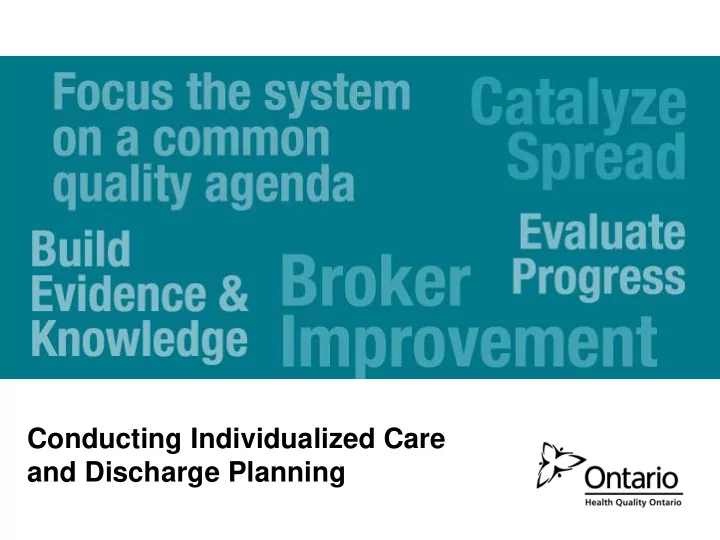

Conducting Individualized Care and Discharge Planning
Aniin www.HQOntario.ca
How to Participate Today • Open and close your Panel • View, Select, and Test your audio • Submit text questions • Raise your hand www.HQOntario.ca 2
How to use this time well www.HQOntario.ca
Presenter Disclosure Presenter(s) • Julie Nicholls, Tracy Howson(HQO) • Dr. Jocelyn Charles • Dr. Kaplan Relationships with commercial interests: • Grants/Research Support: Not Applicable • Speakers Bureau/Honoraria: Not Applicable • Consulting Fees: Not Applicable • Other: Not Applicable www.HQOntario.ca 4
Disclosure of Commercial Support • This program has received no commercial or financial support • This program has received no in-kind commercial or financial support • Potential for Conflict(s) of interest: No speaker has received payment or funding from any for-profit organization No organization has a product that will be discussed in the program www.HQOntario.ca 5
Some Helpful Resources: HQO Improvement Packages Chronic Disease Management Transitions Supporting of Care Health Independence www.HQOntario.ca 6
www.HQOntario.ca 7 7
Transitions of Care Improvement Package Individualized care planning Medication Reconciliation Health literacy Risk assessment and follow-up care planning www.HQOntario.ca 8
Agenda • What is Individualized Care and Discharge Planning? • What are the elements of care coordination? • Hear from Drs. Charles and Kaplan and their care coordination tool. • Share resources available • Raising the challenge of “What you can do by next Tuesday” www.HQOntario.ca 9
Individual Care Planning: What does it mean? www.HQOntario.ca 10
Discharge Planning: Best Practices Individualized pre-discharge planning should be a multi- component intervention, including some combination of the following: • patient education; • patient-centred discharge instructions; and • coordination/communication with family physicians and other appropriate community-based services. - Ontario Health Technology Advisory Committee (OHTAC), April 2013 www.HQOntario.ca 11
Three Categories of Best Practices 1. Category 1: Pre-Discharge Practices 2. Category 2: Discharge Planning Processes 3. Category 3: Assessment for Post-Transition Risk and Activation of Post-Discharge Follow Up www.HQOntario.ca 12
Category 1: Pre-Discharge Practices 1. Pre-discharge planning is incorporated as a standard of care for complex patients admitted to hospital 2. Patients and caregivers are involved as partners in the discharge planning process 3. Individualized comprehensive assessments and care plans are developed for complex patients on admission www.HQOntario.ca 13
Category 2: Discharge Planning Processes 1. Individualized discharge plans are developed on admission for patients with complex needs 2. Protocols are established to ensure medication reconciliation at key transition points 3. Families/caregivers are provided with information and resources to support their transition www.HQOntario.ca 14
Category 3: Assessment for Post-Transition Risk and Activation of Post-Discharge Follow Up 1. Standardized risk assessment tools are used to assess and stratify complex patients at discharge 2. Appointments are booked with the patient’s primary care provider 3. Complex patients receive a follow up phone call within 48 hours of discharge from hospital www.HQOntario.ca 15
Additional System-Wide Goals 1. Adoption of a standardized discharge summary template for use among all health care organizations that perform discharge planning. 2. System-wide implementation of designated supports for complex patients in the post transition follow-up period. www.HQOntario.ca 16
Provincial Activity in Support of Coordinated Care Planning Care coordination requires: • Patient centred approach • Care providers working together • Ability to share information across the continuum www.HQOntario.ca 17
Care Coordination Requirements • Commitment to data quality, using standard language – balanced with flexibility to share complex information • Plain but precise language • Comprehensive – include social determinants of health as well as physical and mental health • Patient-driven www.HQOntario.ca 18
A Reminder: How to Join the Conversation • ALL participants are muted • If at anytime you have a question or comments during the presentation, you can ask by: Typing a question into the Question Box Dial in by phone: 1-877-273-4202 2961738# TYPE QUESTION HERE www.HQOntario.ca 19
Developments From the Field DR. CHARLES & DR. KAPLAN Dr. Jocelyn Charles Dr. David Kaplan www.HQOntario.ca 20
www.HQOntario.ca 21
www.HQOntario.ca 22
www.HQOntario.ca 23
www.HQOntario.ca 24
www.HQOntario.ca 25
www.HQOntario.ca 26
www.HQOntario.ca 27
www.HQOntario.ca 28
www.HQOntario.ca 29
www.HQOntario.ca 30
www.HQOntario.ca 31
www.HQOntario.ca 32
www.HQOntario.ca 33
www.HQOntario.ca 34
www.HQOntario.ca 35
www.HQOntario.ca 36
www.HQOntario.ca 37
www.HQOntario.ca 38
www.HQOntario.ca 39
www.HQOntario.ca 40
www.HQOntario.ca 41
www.HQOntario.ca 42
www.HQOntario.ca 43
www.HQOntario.ca 44
www.HQOntario.ca 45
www.HQOntario.ca 46
www.HQOntario.ca 47
www.HQOntario.ca 48
www.HQOntario.ca 49
Questions? www.HQOntario.ca 50
HQO & bestPATH resources www.hqontario.ca/bestpath www.HQOntario.ca 51
Key Resources • bestPATH – Transitions of Care - Evidence Supported Improvement Package (November 2012) • Ontario Health Technology Assessment Series; Vol. 13: No. TBA, pp.1-73 (April 2013) • Ontario Health Technology Advisory Committee (OHTAC). (April 2013- draft publication). Optimizing Chronic Disease Management in the Community (Outpatient) Setting (OCDM) • Quality Compass www.HQOntario.ca 52
www.HQOntario.ca 53
Until we meet again What idea can you use or implement by Next Tuesday? www.HQOntario.ca 54 54
www.HQOntario.ca
Recommend
More recommend